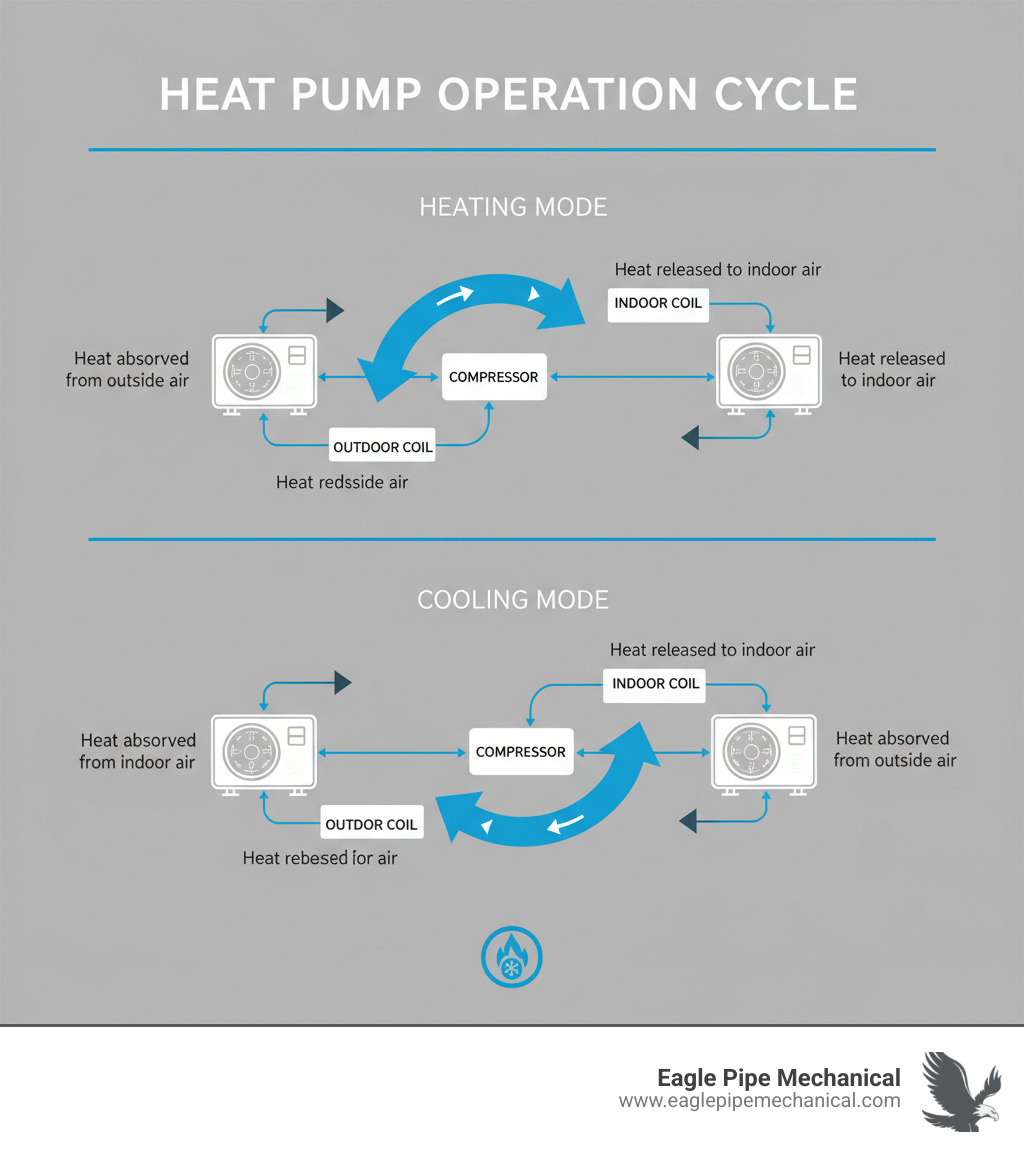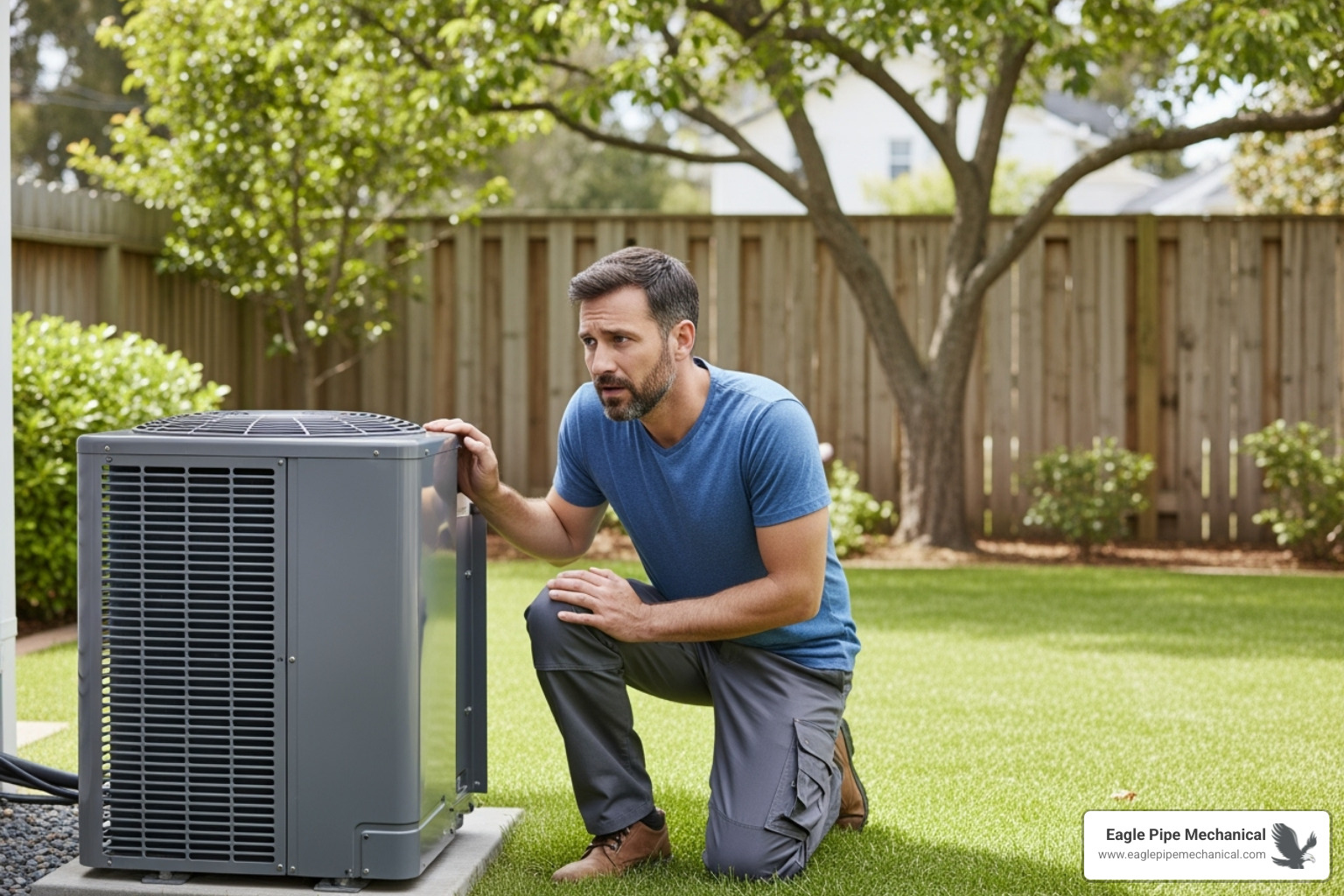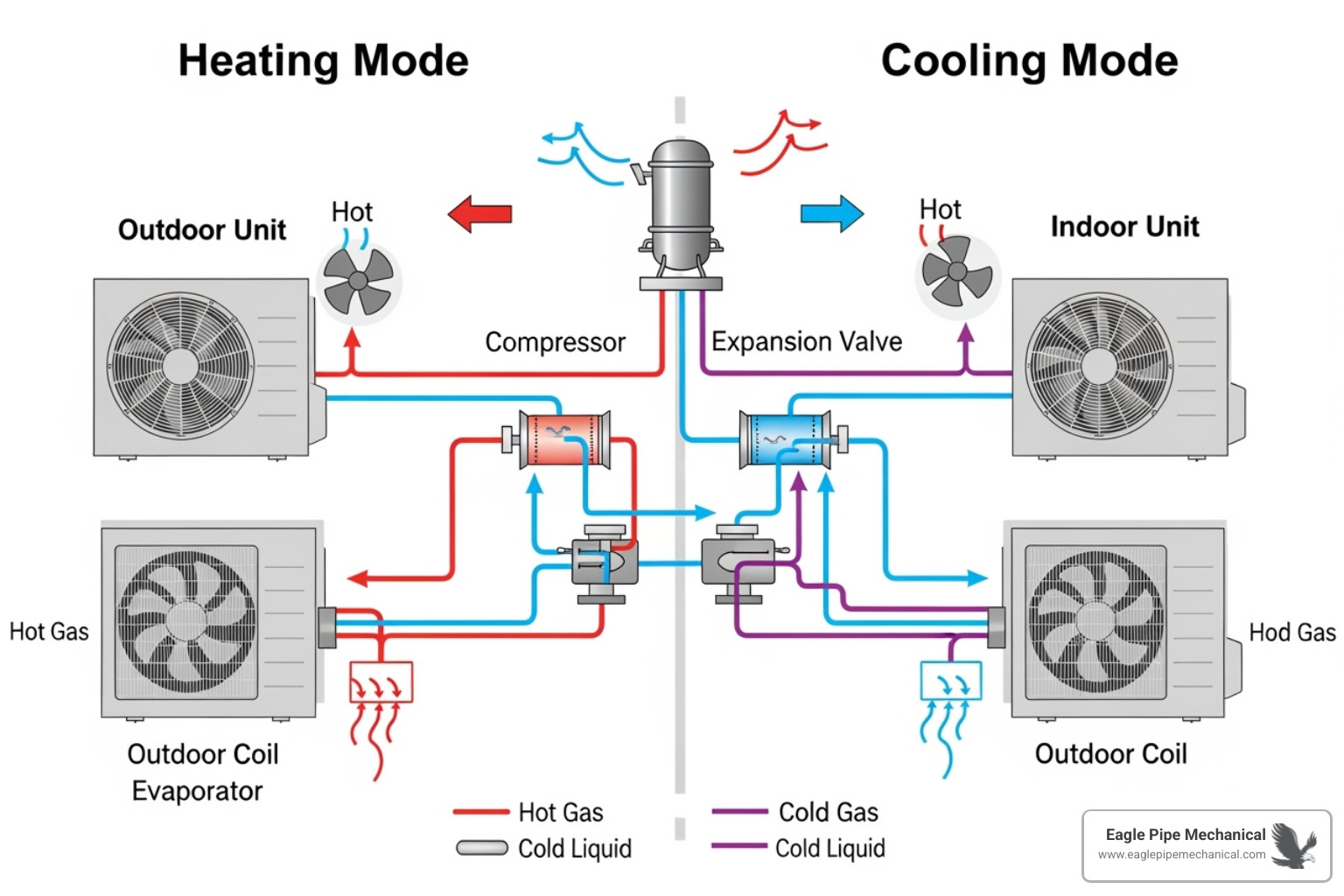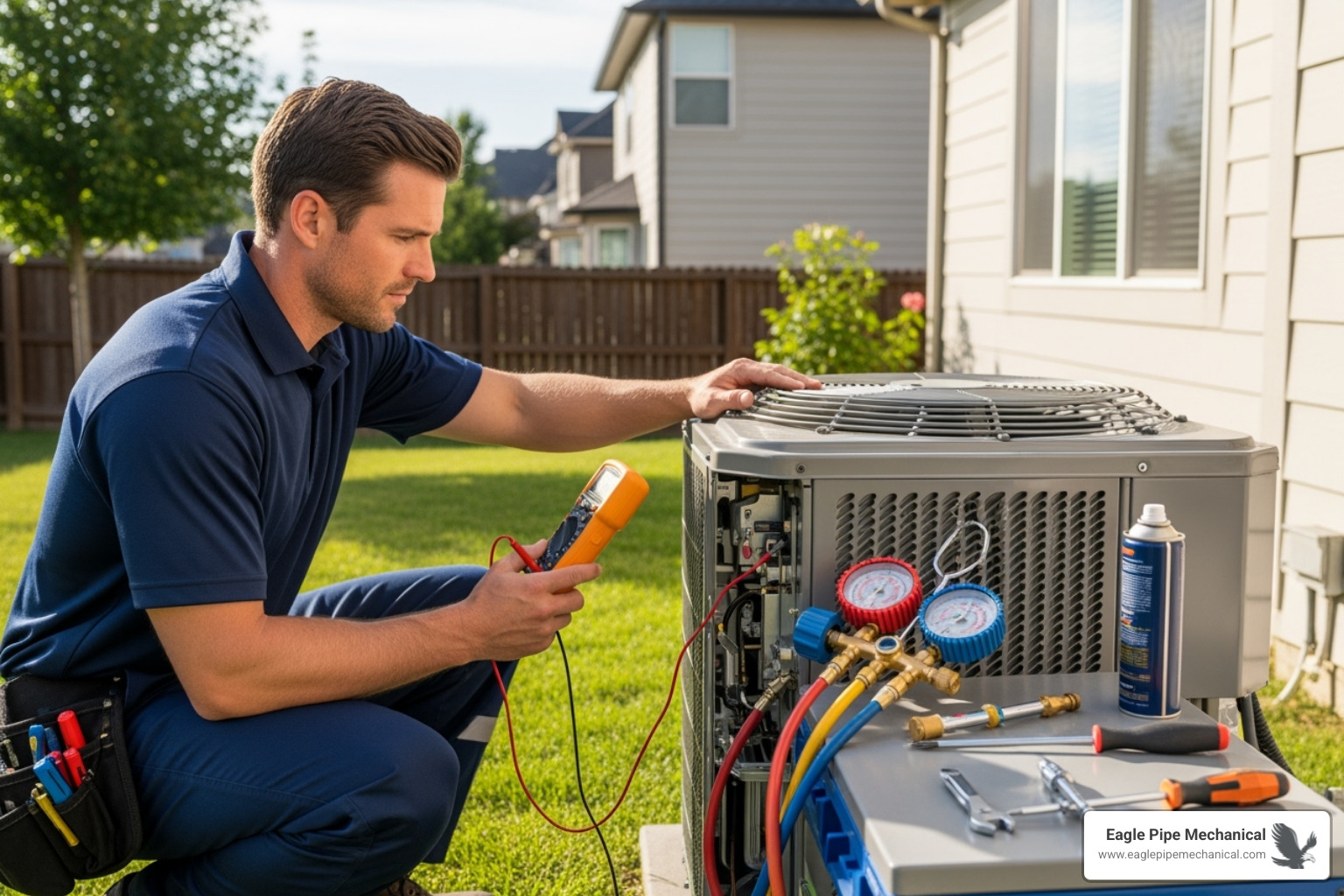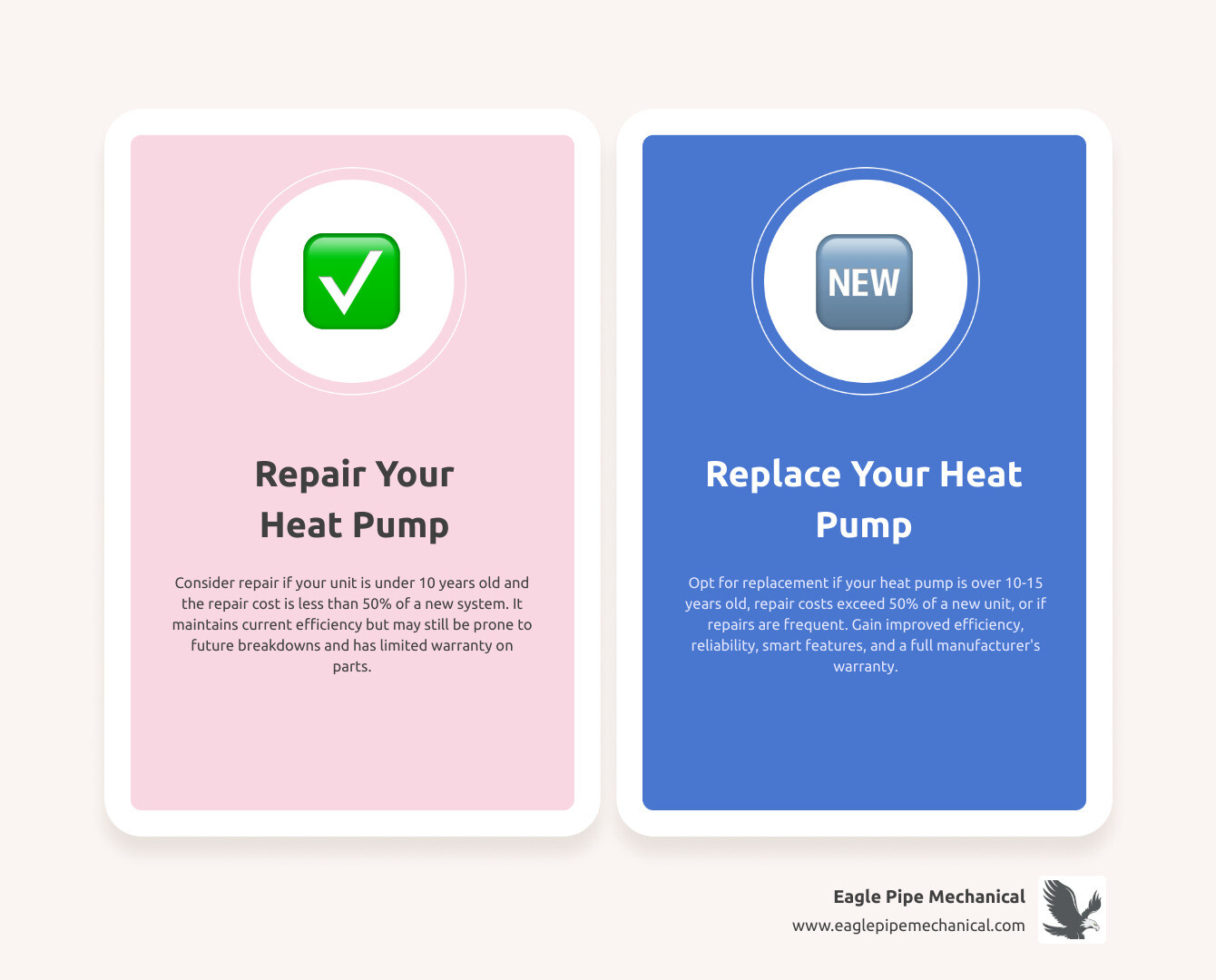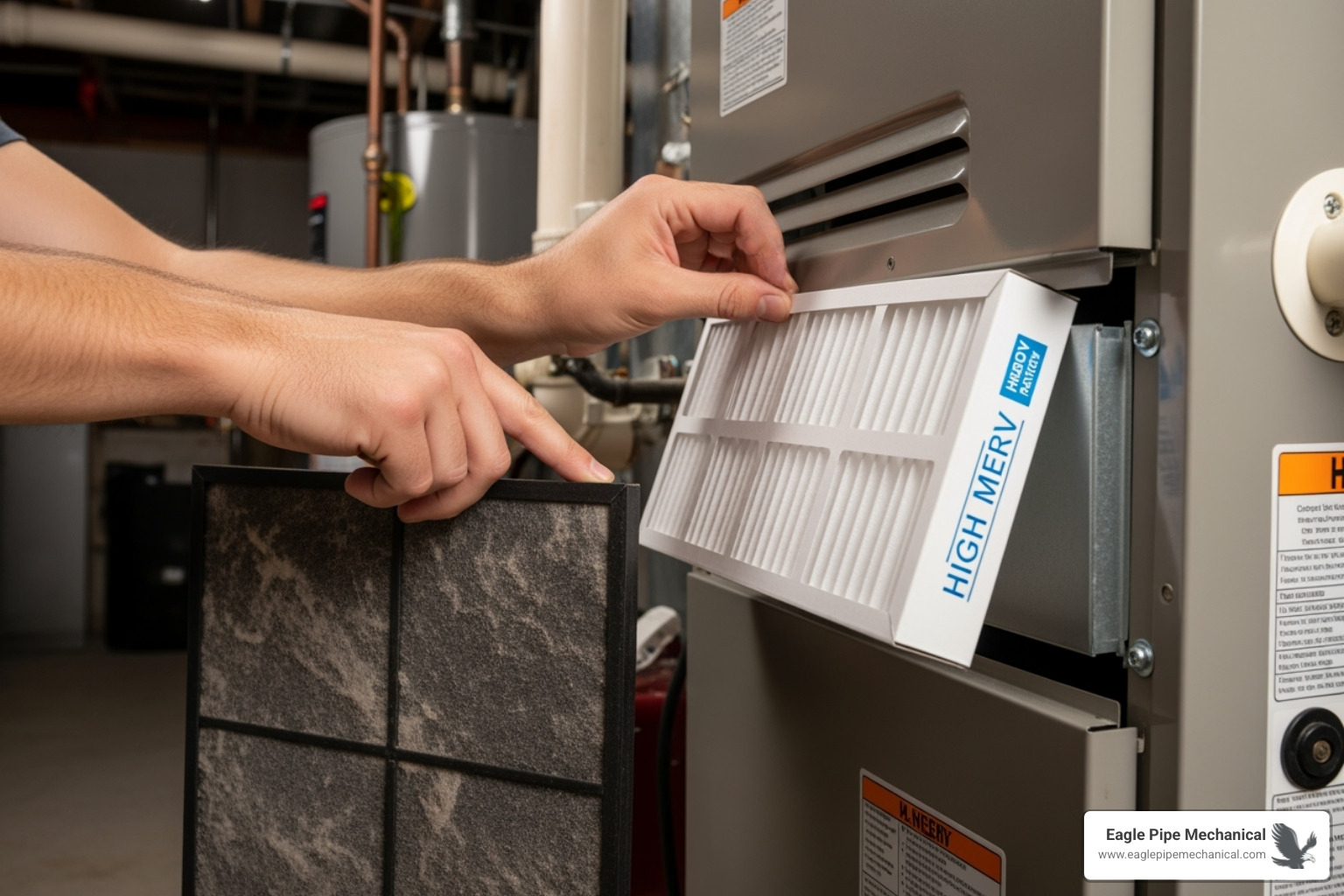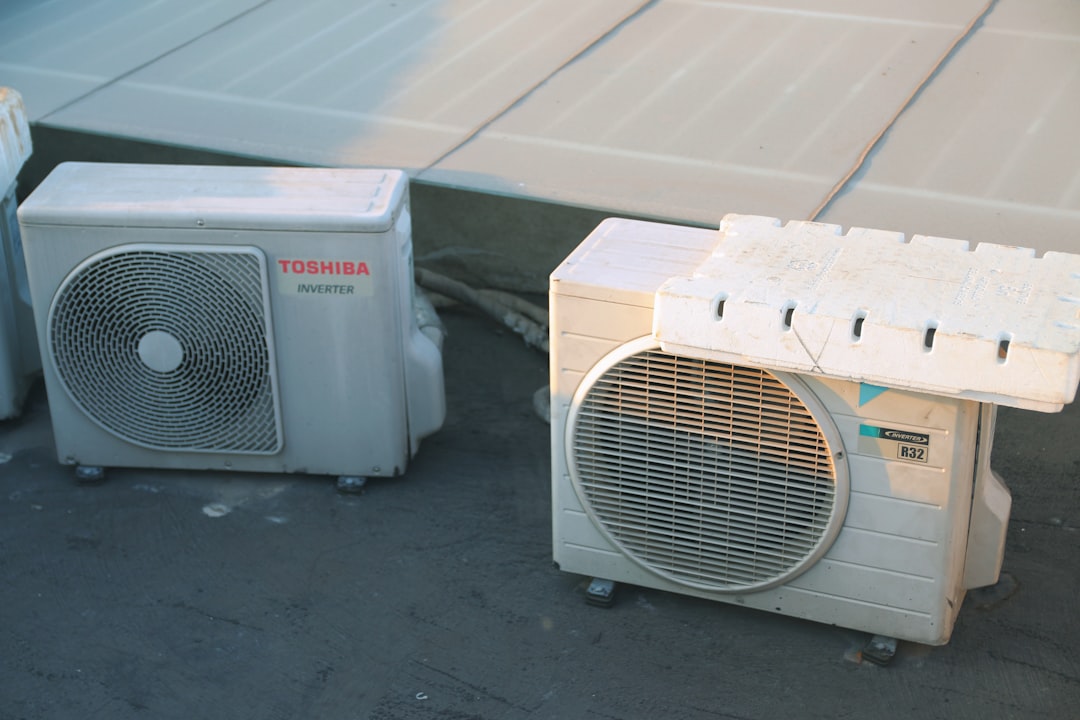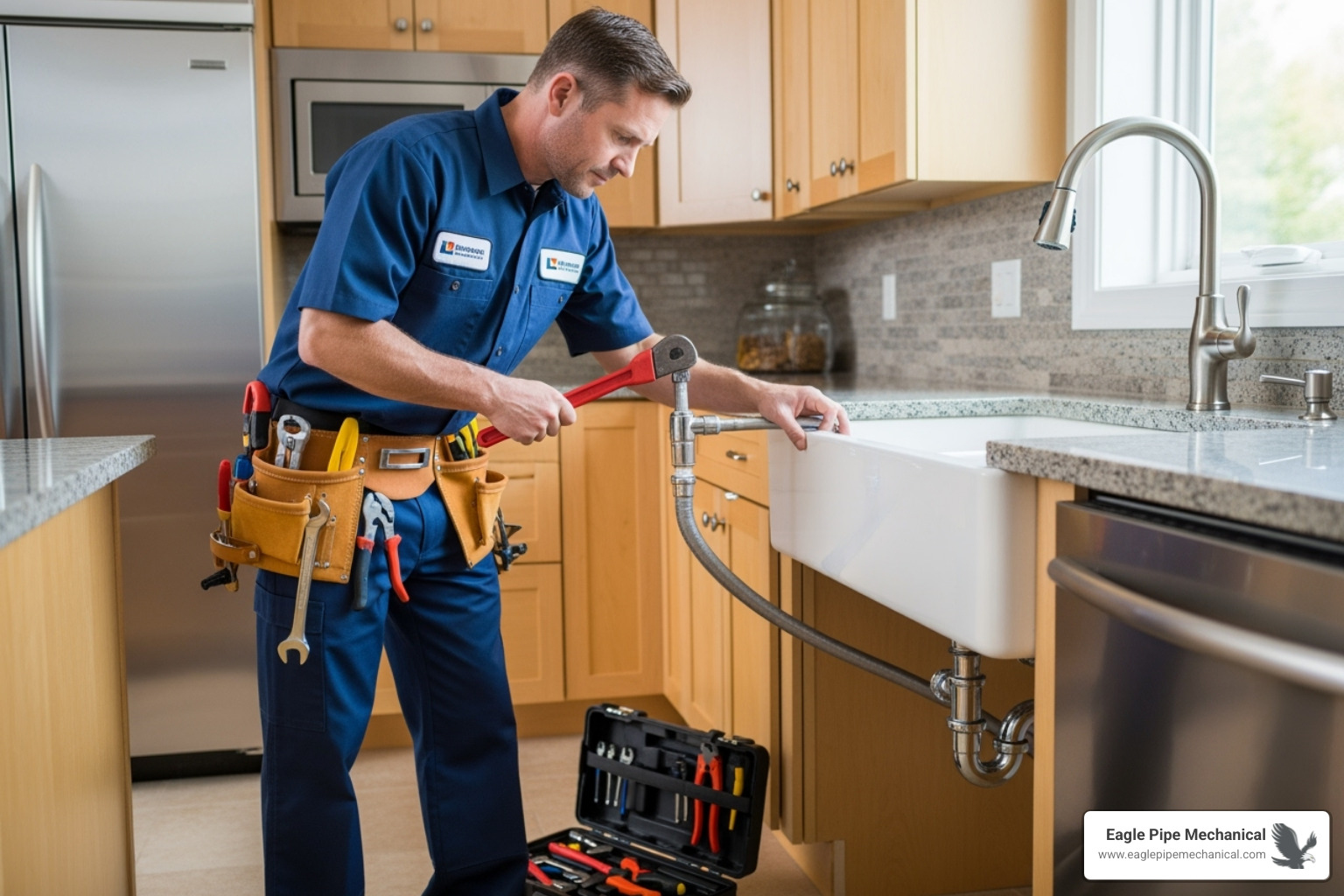Why Your Heat Pump Needs Expert Care When Things Go Wrong
When you need a heat pump repair service, you’re looking for fast, reliable professionals who can restore your home’s comfort. Here’s what you need to know:
Top Signs You Need Heat Pump Repair:
- Inconsistent heating or cooling
- Strange noises like grinding or squealing
- Sudden spikes in your energy bills
- Ice buildup on the outdoor unit
- Weak airflow from your vents
- System cycling on and off frequently
What to Expect from Professional Service:
- Diagnostic fee (often applied to repair cost)
- Licensed, insured technicians
- Prompt service
- Transparent pricing
- Warranty on parts and labor
Your heat pump works year-round, transferring heat from outside to warm your home in winter, then reversing the process to cool it in summer.
When something goes wrong, you feel it immediately. Heat pumps are complex systems with electrical components, refrigerants, and mechanical parts that require professional expertise to diagnose and repair safely. The good news is that most problems are fixable when caught early. This guide will help you recognize the warning signs and choose the right repair service to get your home comfortable again.
Is Your Heat Pump Crying for Help? 7 Telltale Signs You Need a Repair
Your heat pump will send signals when something’s not right. Learning to spot these early warning signs can save you from an uncomfortable home and prevent a simple repair from turning into an expensive emergency.
- Inconsistent temperatures: If some rooms are chilly while others are toasty, or the system struggles to reach the set temperature, it’s a sign of poor airflow or heat transfer issues.
- Unusual noises: Grinding, squealing, rattling, or hissing sounds are not normal. Grinding can mean worn motor bearings, while hissing may signal a refrigerant leak. These sounds often point to failing internal parts. For more details, see our guide on Heat Pump is Making Unusual Sounds.
- Increased energy bills: A sudden jump in your electricity costs without a change in usage is a clear red flag that your heat pump is losing efficiency.
- Frequent cycling: If your system turns on and off in short bursts every few minutes, it could be a thermostat issue, a clogged filter, or an improperly sized system.
- Ice buildup: While a little frost is normal in winter, thick ice on the outdoor coils that won’t melt signals trouble, often pointing to refrigerant leaks or defrost cycle problems.
- Poor airflow: Weak or insufficient air from your vents can stem from clogged filters, blocked ducts, or a failing blower motor.
- System won’t stay on: A unit that won’t run consistently may have electrical problems or component failures that need professional attention.
When you notice any of these signs, it’s time to call a heat pump repair service. Catching problems early almost always means simpler, less expensive fixes. You can learn more about typical issues in our comprehensive guide to Common Heat Pump Repairs.
Why These Signs Matter
Ignoring your heat pump’s calls for help can be costly.
- Reduced efficiency: A struggling heat pump uses more energy to do the same job, which shows up directly on your utility bills.
- Potential for major damage: A small problem like worn bearings can lead to complete compressor failure if ignored, turning a minor repair into a major expense.
- Compromised home comfort: Your home should be a comfortable refuge, not a place where you’re constantly adjusting the thermostat.
Understanding Your Heat Pump: How It Works and Why It Fails
Your heat pump doesn’t create heat; it moves it. Using a refrigerant cycle, it extracts heat from the outdoor air (even when it’s cold) and transfers it inside. In summer, it reverses the process to cool your home.
The compressor pressurizes the refrigerant, making it hot. This hot refrigerant flows through the indoor coil, releasing heat into your home. The reversing valve directs the flow, switching between heating and cooling. The outdoor coil either absorbs heat from the air (heating mode) or releases it (cooling mode).
How This Relates to Common Repair Issues
Most calls for heat pump repair service trace back to one of these core components failing.
- Refrigerant leaks: When refrigerant escapes, the system can’t transfer heat effectively. Signs include hissing sounds, poor performance, or ice buildup.
- Electrical faults: Failed capacitors, wires, or control boards can cause the system to shut down, cycle erratically, or not start at all.
- Frozen coils: Often caused by low refrigerant or restricted airflow from dirty filters, frozen coils prevent proper heat exchange.
- Blower fan motor issues: A failing indoor or outdoor fan motor results in weak airflow or a complete system shutdown.
- Thermostat malfunctions: An inaccurate thermostat can cause temperature swings or prevent the system from running correctly.
These problems can cascade, which is why professional diagnosis is critical. For more details, visit our page on Common Heat Pump Repairs by Professionals.
Different Types of Heat Pumps and Their Repair Needs
- Air-source heat pumps: The most common type, these units are efficient but can be affected by extreme cold and are prone to ice buildup.
- Geothermal heat pumps: These use stable underground temperatures. While the ground loops are durable, indoor components like the compressor may need service.
- Ductless mini-split systems: Offering room-by-room control, each indoor unit has its own components that may require service.
- Dual fuel systems: Combining a heat pump with a gas furnace, these require technicians with expertise in both technologies.
Each system type requires specific knowledge for proper repair, highlighting the importance of an experienced heat pump repair service.
The Professional Heat Pump Repair Service Process: From Diagnosis to Solution
While a DIY approach can be tempting, heat pump repair service is a job for professionals. Heat pumps contain high-voltage electrical components, pressurized refrigerant requiring certified handling, and complex mechanical parts. A wrong move can cause injury, damage your property, or turn a simple fix into a costly replacement. Furthermore, DIY repairs often void your manufacturer’s warranty. The importance of licensed professionals is paramount for safety and protecting your investment.
For reliable service you can trust, explore our Heat Pump Repairs by Technicians.
Why Professional Repair Beats DIY
- Safety: Technicians are trained to handle high-voltage electricity and pressurized refrigerants safely.
- Specialized tools: Professionals use diagnostic equipment like refrigerant leak detectors and multimeters to accurately pinpoint problems.
- Accurate diagnosis: Experience allows technicians to identify the root cause of a problem, not just the symptom.
- Warranty protection: Professional repairs maintain your manufacturer’s warranty, and reputable companies add their own guarantee on parts and labor.
- Long-term solutions: The goal is to fix the problem correctly the first time, restoring efficiency and extending your system’s lifespan. Learn more about our approach at Effective Heat Pump Repair.
The Cost of a Heat Pump Repair Service: Diagnostics and Fees
Understanding heat pump repair service pricing helps you budget. A diagnostic fee or service call fee is standard, covering the technician’s time and expertise to thoroughly assess your system. This ensures an accurate diagnosis. Typically, this fee is applied toward your total repair cost if you proceed with the work.
Repair costs are influenced by the type of repair, the cost of parts, and the labor required. We always provide clear, upfront estimates before any work begins.
What to Look for in a Reputable Heat Pump Repair Service Provider
- Licensing and insurance: These are non-negotiable. Licensing proves competency, and insurance protects you.
- NATE certifications: North American Technician Excellence (NATE) certification is the gold standard for HVAC expertise.
- Positive customer reviews: Check reviews to gauge a company’s reliability and quality of work.
- Years of experience: An established company has experience with a wide range of makes and models.
- Transparent pricing: Reputable companies provide clear, upfront estimates.
- Community involvement: Companies invested in their community, like supporters of organizations such as Habitat for Humanity, often show a strong commitment to integrity.
Choosing a provider that meets these standards ensures you get a partner in home comfort.
Repair or Replace? Making the Right Financial Decision
When faced with a significant repair bill, homeowners must decide: fix it or replace it? Several factors can guide your decision.
The “50/50 rule” is a helpful guideline: if a repair estimate from your heat pump repair service is 50% or more of the cost of a new unit, replacement is often the smarter financial choice.
Age is a critical factor. Heat pumps have a typical lifespan of 10 to 15 years. If your unit is approaching or has surpassed this age and requires frequent repairs, it may be more cost-effective to replace it. Constant repair bills can quickly add up.
Consider the benefits of a new system:
- Energy efficiency: Modern heat pumps have much higher SEER and HSPF ratings, leading to lower utility bills.
- Reliability and warranty: A new unit comes with a full manufacturer’s warranty and the peace of mind of modern, reliable technology.
- Advanced features: New models may offer smart home integration and other improvements.
| Factor | Repair | Replace |
|---|---|---|
| Age of Unit | Under 10 years | Over 10-15 years |
| Repair Cost | Less than 50% of replacement cost | More than 50% of replacement cost, or frequent repairs |
| Efficiency | Current efficiency maintained | Significantly improved efficiency |
| Reliability | May be prone to future breakdowns | High reliability and full warranty |
| Technology | Older technology | Latest advancements, smart home integration |
| Warranty | Short warranty on parts | Full manufacturer’s warranty |
If your heat pump is relatively young and this is its first major issue, a repair is often the right call. Our team can provide an honest assessment to help you weigh the immediate costs against long-term benefits. For more guidance, see our articles on When to Replace Your Heat Pump and Considering Heat Pump Replacement. If replacement is the answer, our page on When Heat Pump Replacement Necessary can help.
Proactive Care: Homeowner Maintenance to Prevent Costly Repairs
An ounce of prevention is worth a pound of cure, especially for your heat pump. While we’re always ready to provide heat pump repair service, simple homeowner maintenance can prevent many common problems.
- Change air filters regularly: A clogged filter makes your system work harder. Check filters monthly and replace them every 1-3 months.
- Keep the outdoor unit clear: Remove leaves, grass, and other debris. Ensure there are at least two feet of clearance around the unit for proper airflow.
- Check indoor vents: Make sure furniture, rugs, or other items are not blocking supply or return air vents.
These simple steps improve performance and can lower your energy bills. For more tips, see our Heat Pump Maintenance Tips.
The Value of Annual Professional Maintenance
While homeowner tasks are important, they don’t replace a professional tune-up. Annual service is crucial for your system’s health.
During a professional tune-up, our technicians perform a comprehensive check: cleaning coils, inspecting electrical connections, lubricating parts, checking refrigerant levels, and calibrating the thermostat. This service helps ensure system longevity, maintain peak efficiency, and prevent major breakdowns. The energy savings from a well-maintained unit can often pay for the service itself.
Regular maintenance is a smart investment that adds years to your system’s life and reduces the chance of an emergency repair. Learn more about our approach at Simplifying Heat Pump Maintenance and Regular Heat Pump Maintenance.
Frequently Asked Questions about Heat Pump Repair
We know you have questions when your heat pump starts acting up, and we’re here to provide clear, honest answers about heat pump repair service. These are the questions our technicians hear most often from homeowners just like you.
How often should my heat pump be serviced?
We recommend annual service for most systems, ideally before the peak heating or cooling season. For systems under heavy use, semi-annual maintenance may be beneficial. Regular service catches small problems, maintains efficiency, and extends your unit’s lifespan.
How can a malfunctioning heat pump impact my utility bills?
A malfunctioning heat pump works harder and runs longer to heat or cool your home, causing a significant increase in energy consumption. This reduced efficiency can cause your electricity bills to double or even triple. Professional heat pump repair service restores efficiency and brings your energy costs back down.
Is it more cost-effective to repair or replace my heat pump?
This depends on a few factors. Use the 50/50 rule: if repair costs are 50% or more of the price of a new unit, replacement is often a better investment. Also, consider the age. If your heat pump is over 10-15 years old and requires frequent repairs, replacement is likely the more cost-effective choice in the long run. We can provide an honest assessment to help you decide. For more detailed guidance on making this important decision, check out our page on When Heat Pump Replacement Necessary.
Conclusion: Your Partner for Reliable Home Comfort
Your heat pump is the heart of your home’s year-round comfort. When it shows signs of trouble—from inconsistent temperatures and unusual noises to spikes in energy bills—prompt attention is crucial.
This guide has highlighted the key warning signs, the importance of professional heat pump repair service over DIY attempts, and how to make the smart financial decision between repair and replacement. Simple maintenance like changing filters regularly and clearing debris from your outdoor unit can also prevent many problems.
At Eagle Pipe Mechanical, we are your trusted HVAC and plumbing contractor serving Kitsap and Jefferson Counties. We’re committed to providing honest, expert service to ensure your home remains comfortable. Our goal is not just to fix problems, but to build lasting relationships and help you get the most out of your heat pump investment.
When your heat pump starts sending those distress signals, don’t wait for a complete breakdown. Our team of licensed professionals is ready to diagnose the problem accurately, provide transparent pricing, and deliver the expert repair service your system needs.

